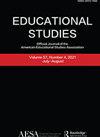Investigating the association between principal learning-centred leadership and teacher instructional practices: the mediating roles of teacher self-efficacy and collective teacher efficacy
IF 1.6
4区 教育学
Q2 EDUCATION & EDUCATIONAL RESEARCH
引用次数: 0
Abstract
ABSTRACTThe purpose of the current study was to investigate the relationship between principal learning-centred leadership and teacher instructional practices, with the mediating role of teacher self-efficacy and collective teacher efficacy. Drawing data from a sample of 1219 teachers in secondary and high schools in Turkey, this study employed a cross-sectional survey design. Confirmatory factor analysis and structural equation modelling were conducted to analyse the data. The findings provided evidence of a small direct association between learning-centred leadership and teacher instructional practices and an indirect relationship mediated by teacher self-efficacy and collective teacher efficacy. Drawing on empirical data from a developing non-Western context, our results contribute nuance to the global knowledge base by confirming the positive and direct link between learning-centred leadership and teacher practices. Our results also underscore the significant mediating role of teacher self-efficacy and collective teacher efficacy between these two constructs. We discuss the implications for policymakers and practitioners.KEYWORDS: Learning-centred leadershipteacher instructional practicesteacher self-efficacycollective teacher efficacy Disclosure statementNo potential conflict of interest was reported by the author(s).Additional informationNotes on contributorsAli Çağatay KılınçAli Cağatay Kılınç is a professor in the Department of Educational Sciences at Karabuk University, Turkey. He received his PhD from the Department of Educational Sciences, Division of Educational Administration, Gazi University, Ankara, Turkey in 2013. His research focus is on educational leadership, school improvement, teacher learning, and practices.Mahmut PolatcanMahmut Polatcan is currently working as an associate professor in the Department of Educational Sciences at Karabuk University, Turkey. He received his PhD in Educational Administration, Institute of Educational Sciences, Ankara University in 2017. His research interests include principal leadership, teacher effectiveness and teacher professional learning, and instructional practices.Onur ErdoğanOnur Erdoğan is an assistant professor in the Department of Educational Sciences at Gazi University, Ankara, Turkey. He received his PhD in Educational Administration, Institute of Educational Sciences, Gazi University in 2018. His research interests include leadership, positive psychology, autonomy, organizational ethic and school climate.Ferudun SezginFerudun Sezgin is a professor in the Department of Educational Sciences at Gazi University, Ankara, Turkey. He received his PhD from the Department of Educational Administration, Institute of Educational Sciences, Gazi University in 2006. His research interests include school culture, teacher psychological hardiness, school principal mentoring, teacher leadership, organizational commitment, and organizational citizenship.Servet ÖzdemirServet Özdemir is a professor in the Department of Educational Sciences at Başkent University, Ankara, Turkey. He received his PhD from the Department of Educational Sciences, Division of Educational Administration, Selçuk University. He formerly worked as a Ministry of National Education General Directorate for several years. His research focuses include organizational behavior, educational leadership, and educational innovation.校长以学习为中心的领导与教师教学实践的关系:教师自我效能感与教师集体效能感的中介作用
摘要本研究旨在探讨校长以学习为中心的领导与教师教学实践的关系,并以教师自我效能感和教师集体效能感为中介。本研究采用横断面调查设计,从土耳其的1219名初中和高中教师中抽取数据。采用验证性因子分析和结构方程模型对数据进行分析。研究结果表明,以学习为中心的领导与教师教学实践之间存在少量的直接关联,而教师自我效能感和教师集体效能感之间存在间接关联。利用来自发展中的非西方背景的经验数据,我们的研究结果通过确认以学习为中心的领导与教师实践之间的积极和直接联系,为全球知识库做出了细微的贡献。我们的研究结果也强调了教师自我效能感和集体效能感在这两个构念之间的显著中介作用。我们讨论了对政策制定者和实践者的影响。关键词:以学习为中心的领导教师教学实践教师自我效能感教师集体效能感披露声明作者未报告潜在的利益冲突作者简介sali Çağatay KılınçAli Cağatay Kılınç是土耳其卡拉布鲁克大学教育科学系的教授。他于2013年获得土耳其安卡拉加齐大学教育科学系教育管理系博士学位。他的研究重点是教育领导、学校改进、教师学习和实践。Mahmut Polatcan目前在土耳其卡拉布鲁克大学教育科学系担任副教授。2017年获得安卡拉大学教育科学研究所教育管理博士学位。主要研究方向为校长领导、教师效能与教师专业学习、教学实践。Onur ErdoğanOnur Erdoğan是土耳其安卡拉加齐大学教育科学系的助理教授。2018年获加济大学教育科学研究所教育管理专业博士学位。他的研究兴趣包括领导力、积极心理学、自主性、组织伦理和学校氛围。Ferudun Sezgin是土耳其安卡拉加齐大学教育科学系的教授。2006年毕业于Gazi大学教育科学研究所教育行政学系,获博士学位。主要研究方向为学校文化、教师心理素质、校长指导、教师领导、组织承诺、组织公民。Servet ÖzdemirServet Özdemir是土耳其安卡拉ba肯特大学教育科学系的教授。他毕业于sel大学教育行政学部教育科学系,获博士学位。他曾在国家教育部总局工作多年。主要研究方向为组织行为学、教育领导和教育创新。
本文章由计算机程序翻译,如有差异,请以英文原文为准。
求助全文
约1分钟内获得全文
求助全文
来源期刊

Educational Studies
EDUCATION & EDUCATIONAL RESEARCH-
CiteScore
5.50
自引率
0.00%
发文量
60
期刊介绍:
Educational Studies aims to provide a forum for original investigations and theoretical studies in education. The journal publishes fully refereed papers which cover applied and theoretical approaches to the study of education. Papers should constitute original research, and should be methodologically sound, theoretically informed, and of relevance to an international audience. The journal is particularly interested in research that aims to inform educational practice(s) within and/or across sectors. Whilst the journal is principally concerned with the social sciences, contributions from a wider field are also encouraged. Empirically-based papers are particularly welcome.
 求助内容:
求助内容: 应助结果提醒方式:
应助结果提醒方式:


